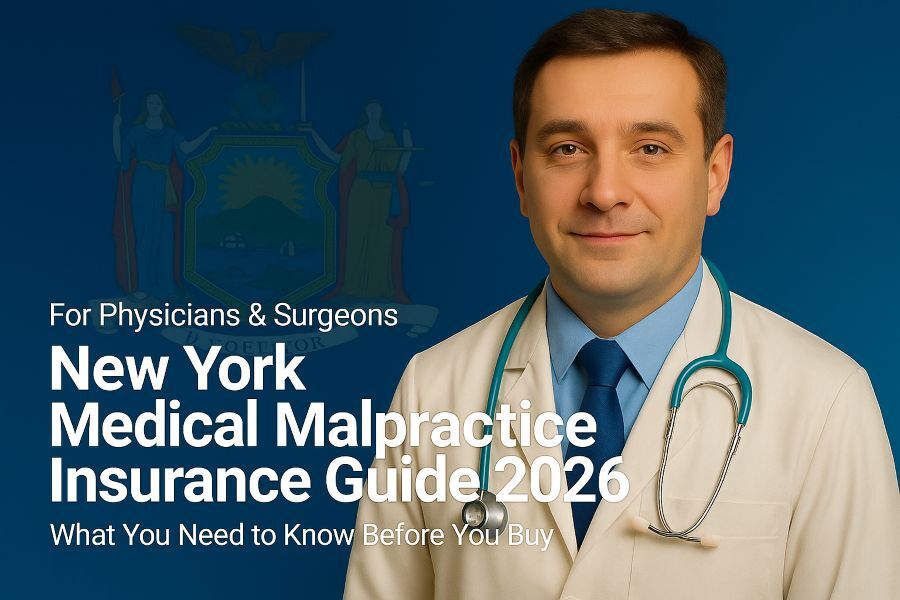Disability Insurance is Paycheck Protection for Doctors
Physicians often protect their practices from harm with medical malpractice insurance, but what if you sustain a disabling illness or injury that prevents you from practicing medicine? Disability insurance provides financial protection if you should become unable to work due to an injury or illness.
Why Doctors Need Disability Insurance
It’s likely that your earning potential as a medical professional is your most valuable asset. If you sustain a disabling illness or injury that prevents you from practicing medicine, disability insurance will provide a safety net by replacing a portion of your income. You can protect yourself and your assets – even if you can’t earn a paycheck.
Get in touch with a
Disability Insurance
Specialist
No physician wants to think about the worst-case scenario: that they can no longer physically or mentally perform the job they’ve dedicated their lives to. But what would it look like if you couldn’t see patients – or generate income – for a year, two years, or even a decade? Doctors often pay attention to life insurance needs but fail to consider the possibility of a debilitating incident that brings their medical career to a standstill, whether temporarily or permanently.
As a medical malpractice insurance broker who works with and supports independent physicians and small groups of all kinds, our mission at MEDPLI is to make navigating the complex world of insurance a little less painful, so we’ve put this guide together for doctors who are interested in learning the basics of disability insurance.
Features Doctors Should Look For in a Disability Insurance Policy
Individual vs Group Disability Insurance
Even if your workplace offers group long-term disability insurance, you won’t be able to tailor it to your unique needs. Investing in an additional disability policy provides more robust coverage. Individual coverage stays with you if you switch practices, and the benefit income these policies provide is usually tax-free because premiums are paid with after-tax dollars. Most insurance companies will issue individual disability insurance coverage equal to approximately 60% of earned income.
Short-term vs Long Term Disability Coverage
Short term disability is designed to cover temporary injuries and illnesses – usually 3-6 months. Short term disability is usually provided by your employer as a workplace benefit to supplement your income until you are able to return to work, and isn’t typically offered for individual purchase. For coverage in the event of a serious injury or illness, you need long term disability insurance.
True Own-Occupation Definition of Disability
Perhaps the most important feature in a disability insurance policy is a true own-occupation definition of disability. True-own occupation disability insurance protects you in the event you’re not able to do the duties of your own occupation.
Surgeons should be certain their disability insurance will pay in the event that they cannot practice surgery, even if they could practice a less physically demanding job in the same field. For example, an own-occupation policy will pay a claim if a cardiac surgeon has severe arthritis and can no longer practice cardiac surgery. A less expensive policy (like an any-occupation policy) would not pay the surgeon’s claim if they are physically able to practice office-based cardiology. Without true own-occupation insurance, you will not be able to collect benefits if you are still able to do some of the functions of your job.
How Much Does Disability Insurance for Doctors Cost?
Most physicians spend 2% to 5% of their annual income on disability insurance. There are a variety of factors that affect the cost of disability insurance, including but not limited to:
Just as with medical malpractice insurance, the easiest way to get a tailored policy that fits your needs is by consulting with an independent broker that offers disability insurance for doctors. An independent broker like Leveragerx.com can help you find the best rates from A-rated carriers and shop around for you, because they don’t represent the interests of a specific insurance company.
Still have questions about disability insurance? We’re happy to help guide you! Fill out the form below and we’ll recommend a qualified broker or contact us at 1-800-969-1339 to speak directly with our team.
Get in touch with a
Disability Insurance
Specialist
About the Author
Max Schloemann is a medical malpractice insurance broker helping physicians and surgeons secure Medical Professional Liability coverage. A Magna Cum Laude graduate of Southern Illinois University’s College of Business, he was named Outstanding Management Senior.
Max began his career in 2008 at an industry-leading firm and founded MEDPLI in 2017 to guide private practice doctors and physicians in transition through the complexities of malpractice insurance.
Outside of work, Max, his wife Kristen (a Physician Assistant), and their four kids enjoy the outdoors and attending the kids’ sporting events. For malpractice insurance questions, you can contact Max here.
Latest from the Medical Malpractice Insurance Blog
View our 2026 Georgia medical malpractice insurance rates by specialty, carriers, payouts & state regulations. Get your custom MEDPLI quote today.
Explore 2026 Illinois medical malpractice insurance costs, top A-rated insurers, payout trends & the latest state regulations. Get your free quote today.
GUIDE: Overview of New York medical malpractice insurance rates by specialty, top carriers, payout statistics, and state regulations. Get a custom quote here.
See 2026 California medical malpractice insurance rates by specialty, carriers, payouts, and regulations. Get your custom MEDPLI quote today.







